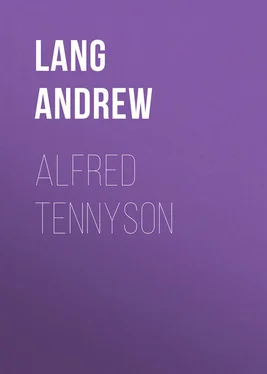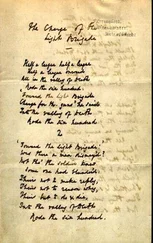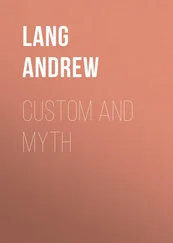Andrew Lang - Alfred Tennyson
Здесь есть возможность читать онлайн «Andrew Lang - Alfred Tennyson» — ознакомительный отрывок электронной книги совершенно бесплатно, а после прочтения отрывка купить полную версию. В некоторых случаях можно слушать аудио, скачать через торрент в формате fb2 и присутствует краткое содержание. Жанр: foreign_antique, foreign_prose, на английском языке. Описание произведения, (предисловие) а так же отзывы посетителей доступны на портале библиотеки ЛибКат.
- Название:Alfred Tennyson
- Автор:
- Жанр:
- Год:неизвестен
- ISBN:нет данных
- Рейтинг книги:5 / 5. Голосов: 1
-
Избранное:Добавить в избранное
- Отзывы:
-
Ваша оценка:
- 100
- 1
- 2
- 3
- 4
- 5
Alfred Tennyson: краткое содержание, описание и аннотация
Предлагаем к чтению аннотацию, описание, краткое содержание или предисловие (зависит от того, что написал сам автор книги «Alfred Tennyson»). Если вы не нашли необходимую информацию о книге — напишите в комментариях, мы постараемся отыскать её.
Alfred Tennyson — читать онлайн ознакомительный отрывок
Ниже представлен текст книги, разбитый по страницам. Система сохранения места последней прочитанной страницы, позволяет с удобством читать онлайн бесплатно книгу «Alfred Tennyson», без необходимости каждый раз заново искать на чём Вы остановились. Поставьте закладку, и сможете в любой момент перейти на страницу, на которой закончили чтение.
Интервал:
Закладка:
The “small sweet Idyll” from
“A volume of the poets of her land”
pure Theocritus. It has been admirably rendered into Greek by Mr Gilbert Murray. The exquisite beauties of style are not less exquisitely blended in the confusions of a dream, for a dream is the thing most akin to The Princess . Time does not exist in the realm of Gama, or in the ideal university of Ida. We have a bookless North, severed but by a frontier pillar from a golden and learned South. The arts, from architecture to miniature-painting, are in their highest perfection, while knights still tourney in armour, and the quarrel of two nations is decided as in the gentle and joyous passage of arms at Ashby de la Zouche. Such confusions are purposefully dream-like: the vision being a composite thing, as dreams are, haunted by the modern scene of the holiday in the park, the “gallant glorious chronicle,” the Abbey, and that “old crusading knight austere,” Sir Ralph. The seven narrators of the scheme are like the “split personalities” of dreams, and the whole scheme is of great technical skill. The earlier editions lacked the beautiful songs of the ladies, and that additional trait of dream, the strange trance-like seizures of the Prince: “fallings from us, vanishings,” in Wordsworthian phrase; instances of “dissociation,” in modern psychological terminology. Tennyson himself, like Shelley and Wordsworth, had experience of this kind of dreaming awake which he attributes to his Prince, to strengthen the shadowy yet brilliant character of his romance. It is a thing of normal and natural points de repère ; of daylight suggestion, touched as with the magnifying and intensifying elements of haschish-begotten phantasmagoria. In the same way opium raised into the region of brilliant vision that passage of Purchas which Coleridge was reading before he dreamed Kubla Khan . But in Tennyson the effects were deliberately sought and secured.
One might conjecture, though Lord Tennyson says nothing on the subject, that among the suggestions for The Princess was the opening of Love’s Labour’s Lost . Here the King of Navarre devises the College of Recluses, which is broken up by the arrival of the Princess of France, Rosaline, and the other ladies: —
King . Our Court shall be a little Academe,
Still and contemplative in living art.
You three, Biron, Domain, and Longaville,
Have sworn for three years’ term to live with me,
My fellow-scholars, and to keep those statutes.
Biron . That is, to live and study here three years.
But there are other strict observances;
As, not to see a woman in that term.
[ Reads ] ‘That no woman shalt come within a mile of my Court:’ Hath this been proclaimed?
Long . Four days ago.
Biron . Let’s see the penalty. [ Reads ] ‘On pain of losing her tongue.’
The Princess then arrives with her ladies, as the Prince does with Cyril and Florian, as Charles did, with Buckingham, in Spain. The conclusion of Shakespeare is Tennyson’s conclusion —
“We cannot cross the cause why we are born.”
The later poet reverses the attitude of the sexes in Love’s Labour’s Lost : it is the women who make and break the vow; and the women in The Princess insist on the “grand, epic, homicidal” scenes, while the men are debarred, more or less, from a sportive treatment of the subject. The tavern catch of Cyril; the laughable pursuit of the Prince by the feminine Proctors; the draggled appearance of the adventurers in female garb, are concessions to the humour of the situation. Shakespeare would certainly have given us the song of Cyril at the picnic, and comic enough the effect would have been on the stage. It may be a gross employment, but The Princess , with the pretty chorus of girl undergraduates,
“In colours gayer than the morning mist,”
went reasonably well in opera. Merely considered as a romantic fiction, The Princess presents higher proofs of original narrative genius than any other such attempt by its author.
The poem is far from being deficient in that human interest which Shelley said that it was as vain to ask from him , as to seek to buy a leg of mutton at a gin-shop. The characters, the protagonists, with Cyril, Melissa, Lady Blanche, the child Aglaia, King Gama, the other king, Arac, and the hero’s mother – beautifully studied from the mother of the poet – are all sufficiently human. But they seem to waver in the magic air, “as all the golden autumn woodland reels” athwart the fires of autumn leaves. For these reasons, and because of the designed fantasy of the whole composition, The Princess is essentially a poem for the true lovers of poetry, of Spenser and of Coleridge. The serious motive, the question of Woman, her wrongs, her rights, her education, her capabilities, was not “in the air” in 1847. To be sure it had often been “in the air.” The Alexandrian Platonists, the Renaissance, even the age of Anne, had their emancipated and learned ladies. Early Greece had Sappho, Corinna, and Erinna, the first the chief of lyric poets, even in her fragments, the two others applauded by all Hellas. The French Revolution had begotten Mary Wollstonecraft Godwin and her Vindication of the Rights of Women , and in France George Sand was prominent and emancipated enough while the poet wrote. But, the question of love apart, George Sand was “very, very woman,” shining as a domestic character and fond of needlework. England was not excited about the question which has since produced so many disputants, inevitably shrill, and has not been greatly meddled with by women of genius, George Eliot or Mrs Oliphant. The poem, in the public indifference as to feminine education, came rather prematurely. We have now ladies’ colleges, not in haunts remote from man, but by the sedged banks of Cam and Cherwell. There have been no revolutionary results: no boys have spied these chaste nests, with echoing romantic consequences. The beauty and splendour of the Princess’s university have not arisen in light and colour, and it is only at St Andrews that girls wear the academic and becoming costume of the scarlet gown. The real is far below the ideal, but the real in 1847 seemed eminently remote, or even impossible.
The learned Princess herself was not on our level as to knowledge and the past of womankind. She knew not of their masterly position in the law of ancient Egypt. Gynæocracy and matriarchy, the woman the head of the savage or prehistoric group, were things hidden from her. She “glanced at the Lycian custom,” but not at the Pictish, a custom which would have suited George Sand to a marvel. She maligned the Hottentots.
“The highest is the measure of the man,
And not the Kaffir, Hottentot, Malay.”
The Hottentots had long ago anticipated the Princess and her shrill modern sisterhood. If we take the Greeks, or even ourselves, we may say, with Dampier (1689), “The Hodmadods, though a nasty people, yet are gentlemen to these” as regards the position of women. Let us hear Mr Hartland: “In every Hottentot’s house the wife is supreme. Her husband, poor fellow, though he may wield wide power and influence out of doors, at home dare not even take a mouthful of sour-milk out of the household vat without her permission.. The highest oath a man can take is to swear by his eldest sister, and if he abuses this name he forfeits to her his finest goods and sheep.”
However, in 1847 England had not yet thought of imitating the Hodmadods. Consequently, and by reason of the purely literary and elaborately fantastical character of The Princess , it was not of a nature to increase the poet’s fame and success. “My book is out, and I hate it, and so no doubt will you,” Tennyson wrote to FitzGerald, who hated it and said so. “Like Carlyle, I gave up all hopes of him after The Princess ,” indeed it was not apt to conciliate Carlyle. “None of the songs had the old champagne flavour,” said Fitz; and Lord Tennyson adds, “Nothing either by Thackeray or by my father met FitzGerald’s approbation unless he had first seen it in manuscript.” This prejudice was very human. Lord Tennyson remarks, as to the poet’s meaning in this work, born too early, that “the sooner woman finds out, before the great educational movement begins, that ‘woman is not undeveloped man, but diverse,’ the better it will be for the progress of the world.”
Читать дальшеИнтервал:
Закладка:
Похожие книги на «Alfred Tennyson»
Представляем Вашему вниманию похожие книги на «Alfred Tennyson» списком для выбора. Мы отобрали схожую по названию и смыслу литературу в надежде предоставить читателям больше вариантов отыскать новые, интересные, ещё непрочитанные произведения.
Обсуждение, отзывы о книге «Alfred Tennyson» и просто собственные мнения читателей. Оставьте ваши комментарии, напишите, что Вы думаете о произведении, его смысле или главных героях. Укажите что конкретно понравилось, а что нет, и почему Вы так считаете.












